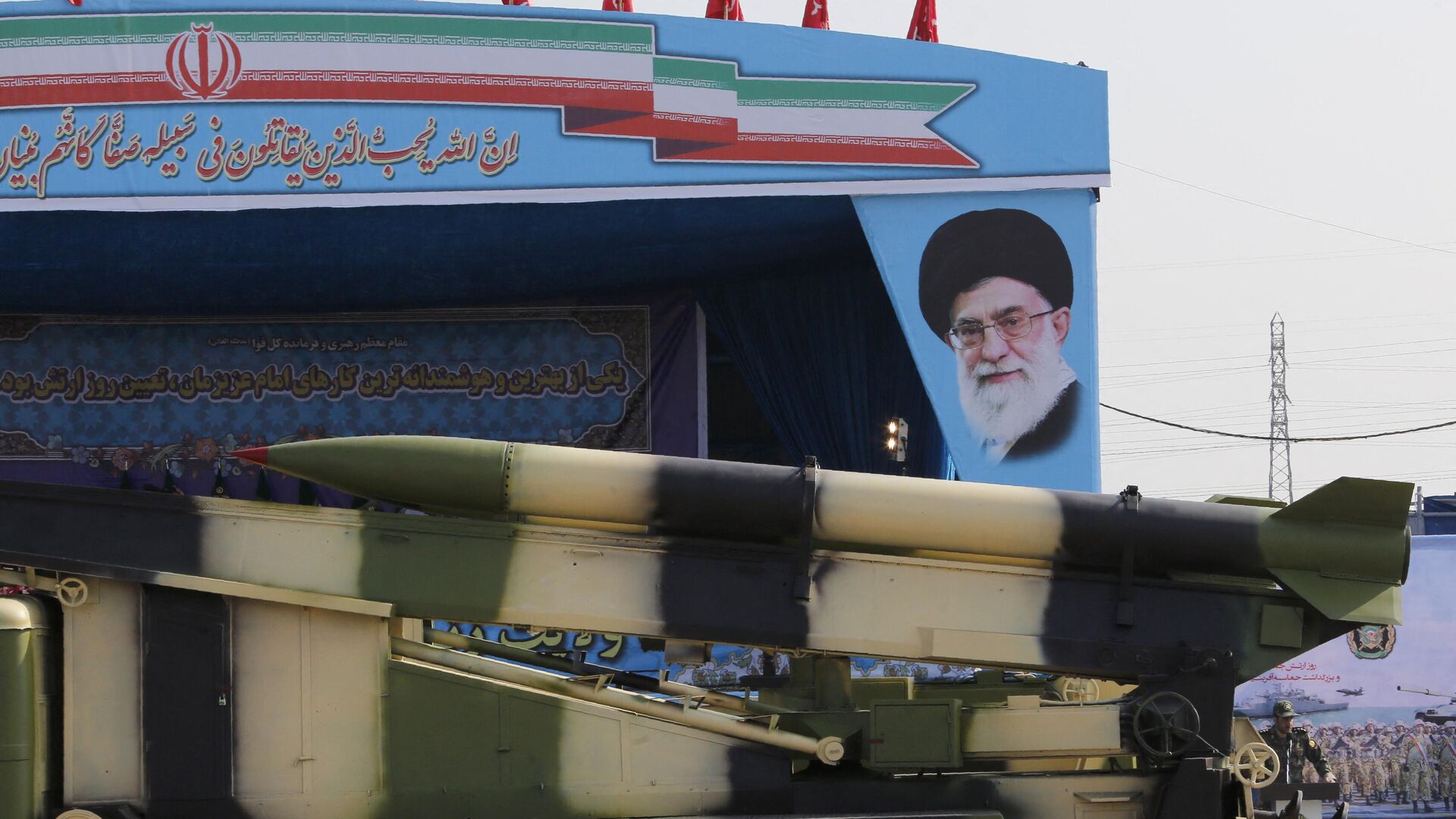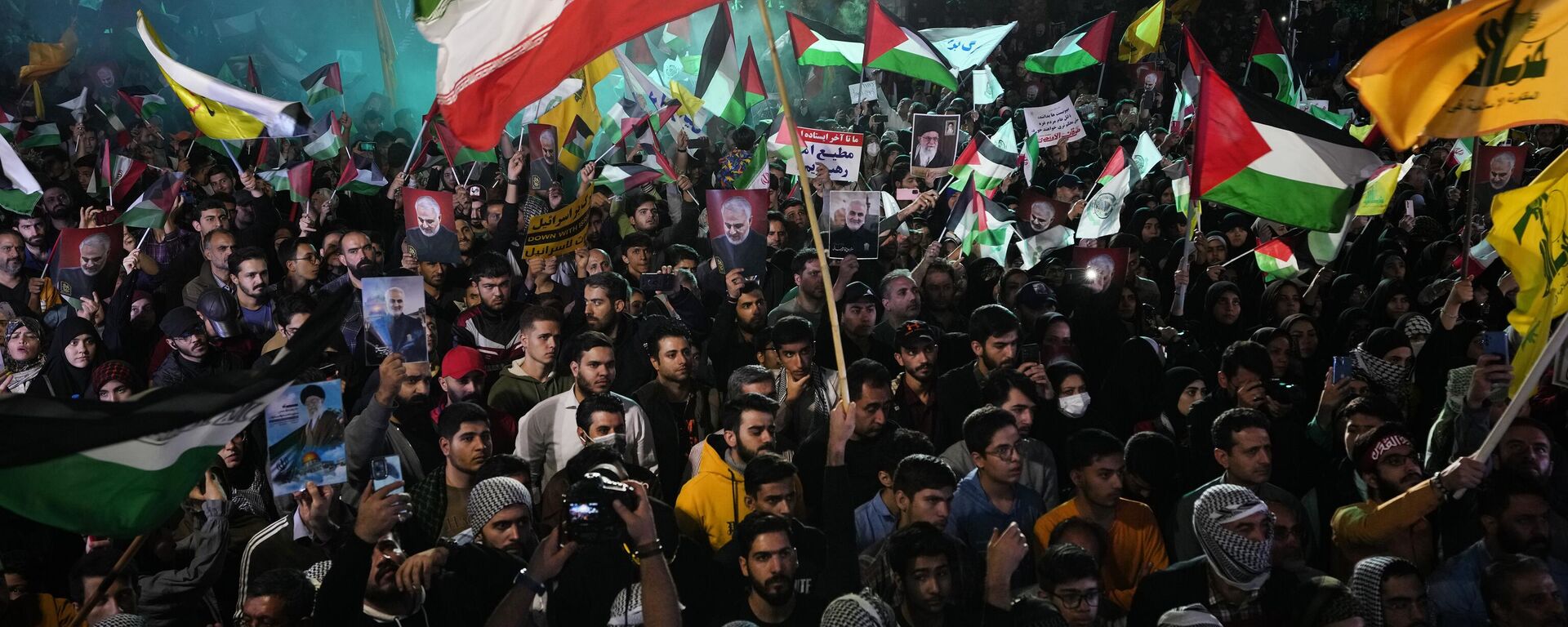https://sputniknews.in/20240412/caught-between-two-fires-how-mideast-escalation-impacts-pakistan-7109690.html
Caught Between Two Fires: How Mideast Escalation Impacts Pakistan
Caught Between Two Fires: How Mideast Escalation Impacts Pakistan
Sputnik India
Following the attack by Israeli warplanes on the Iranian embassy in Syria, which claimed seven lives, including three high-ranking commanders, the situation... 12.04.2024, Sputnik India
2024-04-12T11:13+0530
2024-04-12T11:13+0530
2024-04-12T11:50+0530
sputnik opinion
iran
israel
syria
the united nations (un)
pakistan
saddam hussein
military equipment
military spending
military coup
https://cdn1.img.sputniknews.in/img/07e8/04/0b/7106189_0:0:3414:1921_1920x0_80_0_0_8de2c2c997b11c59ee882eb70a680ceb.jpg
Over the past two weeks, the geopolitical and security situation in the Middle East has become tense due to the looming threat of Iranian retaliation for Israeli attacks. However, in times of war, officials and diplomats of any country are generally granted immunity and should not be targeted or harmed. Israel, however, has flouted this basic international principle.In this regard, Iran's Supreme Leader Ali Khamenei has stated that Israel must be punished for attacking the Iranian embassy compound in Damascus. The most likely scenario is that Iran will not attack Israeli territory directly, but rather through its affiliated networks.The looming question, then, is how this escalation will affect regional and neighboring countries. Pakistan and Iran are already at odds, with each accusing the other of supporting proxies against the other. In addition, Afghanistan, an already unstable country, is grappling with security challenges and terrorism.Iran's Pledge to RespondHistory shows that Iranians have shown remarkable resilience. The Iran-Iraq War of the 1980s is a prominent example, where despite extensive US and Western support for Saddam Hussein's Iraq, Iran survived a decade-long struggle. Moreover, despite decades of sanctions imposed by the US and the West, Iran has managed to adapt and thrive independently.He further said, "I think the attack on Iran's embassy by Prime Minister of Israel Benjamin Netanyahu was politically motivated, possibly aimed at appeasing the right-wing party to counter his opposition, especially as the coalition party has threatened to overthrow him."It is clear that in the event of a major conflict, the world would undoubtedly suffer, but the region would bear the brunt of the consequences. Nevertheless, there remains the possibility of significant retaliation from Iran in such a scenario.In addition, he elaborated, "Pakistan aims to maintain friendly relations with Iran but is unwilling to involve itself in any regional conflict."Regional ImplicationsIf a direct conflict were to break out between Iran and Israel, the flames of war would spread from the Central Asian fronts to the South Asian fronts, such as Pakistan versus Afghanistan. Pakistan is already facing tensions with Iran due to non-state actors and proxy elements, while also being an ally of the West. Given that Iran is Pakistan's neighbor, the situation could escalate further, especially along the Pakistan-Afghanistan border.On April 10, Israel's leader asked the US Middle East envoy to contact the foreign ministers of Qatar, Iraq, Saudi Arabia, and the UAE. These foreign ministers were asked to communicate with their Iranian counterparts in order to reduce tensions with Israel. However, according to a Channel 12 News report, Israel expects a possible attack from Iran after April 12.
https://sputniknews.in/20240406/irans-conundrum-long-fight-against-us-proxies-in-south-asia-7056505.html
iran
israel
syria
pakistan
afghanistan
uae
the united arab emirates (uae)
middle east
Sputnik India
feedback.hindi@sputniknews.com
+74956456601
MIA „Rossiya Segodnya“
2024
Muhammad Sharif
https://cdn1.img.sputniknews.in/img/07e7/0b/05/5257054_0:0:443:444_100x100_80_0_0_b8bd2af32be62a6eecdb4a84c7fd978f.jpg
Muhammad Sharif
https://cdn1.img.sputniknews.in/img/07e7/0b/05/5257054_0:0:443:444_100x100_80_0_0_b8bd2af32be62a6eecdb4a84c7fd978f.jpg
News
en_IN
Sputnik India
feedback.hindi@sputniknews.com
+74956456601
MIA „Rossiya Segodnya“
Sputnik India
feedback.hindi@sputniknews.com
+74956456601
MIA „Rossiya Segodnya“
Muhammad Sharif
https://cdn1.img.sputniknews.in/img/07e7/0b/05/5257054_0:0:443:444_100x100_80_0_0_b8bd2af32be62a6eecdb4a84c7fd978f.jpg
iran, israel, syria, the united nations (un), pakistan, saddam hussein, military equipment, military spending, military coup, military build-up, military exercise, military base, israel defense forces (idf) , afghanistan, tehreek-e-taliban pakistan (ttp), taliban, uae, the united arab emirates (uae), middle east, defense sector, self-defense
iran, israel, syria, the united nations (un), pakistan, saddam hussein, military equipment, military spending, military coup, military build-up, military exercise, military base, israel defense forces (idf) , afghanistan, tehreek-e-taliban pakistan (ttp), taliban, uae, the united arab emirates (uae), middle east, defense sector, self-defense
Caught Between Two Fires: How Mideast Escalation Impacts Pakistan
11:13 12.04.2024 (Updated: 11:50 12.04.2024) Following the attack by Israeli warplanes on the Iranian embassy in Syria, which claimed seven lives, including three high-ranking commanders, the situation represents a remarkable escalation in the Middle East (ME) conflict. Peace and stability in the region are now at risk.
Over the past two weeks, the geopolitical and security situation in the Middle East has become tense due to the looming threat of Iranian retaliation for Israeli attacks. However, in times of war, officials and diplomats of any country are generally granted immunity and should not be targeted or harmed. Israel, however, has flouted this basic international principle.
In this regard, Iran's Supreme Leader Ali Khamenei has stated that Israel must be punished for attacking the Iranian embassy compound in Damascus.
The most likely scenario is that Iran will not attack Israeli territory directly, but rather through its affiliated networks.
The looming question, then, is how this escalation will affect regional and neighboring countries.
Pakistan and Iran are already at odds, with each accusing the other of supporting proxies against the other. In addition,
Afghanistan, an already unstable country, is grappling with security challenges and terrorism.
History shows that Iranians have shown remarkable resilience. The Iran-Iraq War of the 1980s is a prominent example, where despite extensive
US and Western support for
Saddam Hussein's Iraq, Iran survived a decade-long struggle. Moreover, despite decades of sanctions imposed by the US and the West, Iran has managed to adapt and thrive independently.
"First and most, I believe that the attack on any diplomatic or official premises of a country is a violation of the UN Charter and the Geneva Convention, as these places are supposed to have immunity. Therefore, it seems that Iran is planning to retaliate, as indicated by its key leader," Dr. Nazir Hussain, a geo-political analyst, foreign affairs expert, & former Dean of International Relations and Politics, told Sputnik.
He further said, "I think the attack on Iran's embassy by Prime Minister of Israel Benjamin Netanyahu was politically motivated, possibly aimed at appeasing the right-wing party to counter his opposition, especially as the coalition party has threatened to overthrow him."
It is clear that in the event of a major conflict, the world would undoubtedly suffer, but the region would bear the brunt of the consequences. Nevertheless, there remains the possibility of significant retaliation from Iran in such a scenario.
"The relationship between Iran and Israel has been hostile since the fall of the Pahlavi dynasty. The recent bombing of the Iranian consulate in Damascus has escalated tensions, leading Iran to issue threats of retaliation. While the likelihood of a full-scale war between the two nations is low, Iran's response may be limited to embassy bombings or assassinations," Dr Tughral Yamin, a researcher at Institute of Policy studies Islamabad, former Dean of Centre for International Peace & stability, Ex Brigadier of Pakistan’s Army & Political analyst, told Sputnik.
In addition, he elaborated, "Pakistan aims to maintain friendly relations with Iran but is unwilling to involve itself in any regional conflict."
If a direct conflict were to break out between Iran and Israel, the flames of war would spread from the Central Asian fronts to the South Asian fronts, such as Pakistan versus Afghanistan. Pakistan is already facing tensions with Iran due to non-state actors and proxy elements, while also being an ally of the West. Given that Iran is Pakistan's neighbor, the situation could escalate further, especially along the Pakistan-Afghanistan border.
"As far as Pakistan is concern, Islamabad is keen on avoiding conflict in the region at this time. Our focus is on reducing the conflict, as evidenced by Pakistan's resolution in the UN to halt arms supply to Israel, which has received praise from many nations. If this war were to break out, it would have serious implications not only at a geo-economic level, but also for the security and peace of the region. Overall, we are not taking sides in this matter," Dr. N. Hussain said.
On April 10, Israel's leader asked the US Middle East envoy to contact the foreign ministers of
Qatar, Iraq,
Saudi Arabia, and the
UAE. These foreign ministers were asked to communicate with their Iranian counterparts in order to reduce tensions with Israel. However, according to a Channel 12 News report, Israel expects a possible attack from Iran after April 12.
"Despite the visit of the US Middle East envoy to ease the tense situation, the escalation in the Middle East is still very high," expert concluded.



